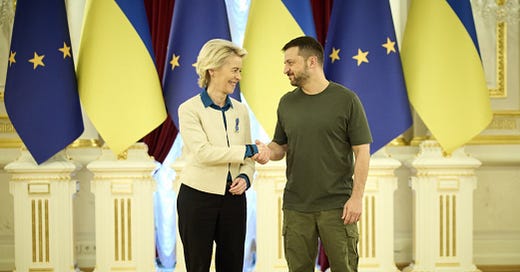The EU's Decision to Die on the Hill that is Ukraine
In a recent talk on Neutrality Studies, Michael von der Schulenburg, a German member of the EU Parliament, puts his finger on the irrational core of the block's collective Ukraine-War Psychosis.
The European Union’s response to the Ukraine conflict has morphed from something that was intended to be a defining moment for its “geopolitical” standing, into the hill on which the entire project is dying. As Michael von der Schulenburg explains, the EU’s militarisation drive, financial overreach, and growing detachment from diplomatic realism are the unmistakable signals of a deeper crisis within the European political elite—a dangerous cocktail of ideological fervor, economic self-destruction, and strategic miscalculation.
At the heart of the issue is the claim that Europe has become irrational in its approach to the war. Once a bastion of diplomacy, the EU has succumbed to a war mentality that echoes past failures. Unlike previous conflicts where negotiations remained on the table, European leadership has embraced an all-or-nothing stance on Ukraine, insisting on total victory over Russia despite the impossibility of achieving it. This is a historical pattern—one that has led Europe into self-destructive wars before.
One of the most striking aspects of this situation is that Europe’s strategy is economically unsustainable. The EU has committed itself to enormous military spending, promising funds it does not have. With ambitions of arming Ukraine, integrating it into the EU, and rebuilding it post-war, the financial burden is staggering. These commitments amount to “trillions,” yet there is no actual money behind them. The EU’s economic reality—shrinking global influence, declining innovation, and increasing internal divisions—suggests that its aspirations are little more than political theater. The EU is essentially committing financial suicide by betting on a conflict it cannot afford.
The most striking aspect is the lack of European agency in the war. In spite of all the grand-standing and posturing, Europe has been reduced to a geopolitical appendage of the United States, following Washington’s lead in prolonging the conflict while shouldering the costs. While the EU sees itself as a global moral authority, it has been sidelined in actual negotiations. Instead, peace talks are being brokered by the U.S. and China, with Europe playing no decisive role. Even within the European Parliament, there exists a near-religious belief in a narrative that contradicts basic military and economic realities.
Another critical failure is Europe’s inability to recognize the shifting geopolitical order. While European leaders continue to push for military escalation, the war has already secured Russia’s strategic objectives. NATO expansion has been curtailed, and Moscow has solidified its influence in global diplomacy. Europe, meanwhile, is left increasingly isolated. Instead of adapting to the changing balance of power, EU leaders cling to an outdated vision of their own relevance, blindly pursuing policies that accelerate their decline.
The EU is hurtling toward collapse, not through military defeat, but through self-inflicted economic ruin and strategic irrelevance. While past European leaders like Willy Brandt or Olof Palme understood the need for diplomacy and realpolitik, today’s EU is driven by ideological rigidity and moral posturing. If Europe does not reassess its approach soon, it may find itself not only on the losing side of the Ukraine conflict but also in a deeper existential crisis of its own making. The lesson here is clear—wars are won not just on battlefields, but in the halls of diplomacy. And on that front, Europe is failing spectacularly.





Some people would argue that the intention behind the militarization of the EU serves the same purpose as the fake COVID pandemic. The same people claim that the euro has no chance of survival and that the "elites" are desperately looking for an excuse for the event when the Euro is going to collapse without taking the blame. The scapegoats will be a virus and Russia. It is a fact that preparations are being made to replace the euro with a digital currency called CBDC. We live in interesting times.
Russia has no interest in rolling all over Europe, even if it had the means to do so. Russia is being used by EU leaders, as well as Starmer, as a rallying point to keep the ailing EU project trundling along. It may well be 5 times wealthier than Russia, but 40 per cent of its GDP goes on its social services.